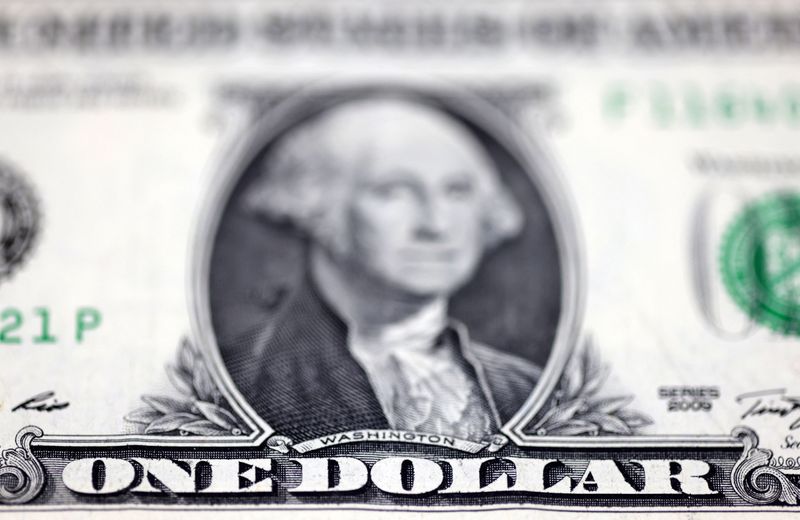By Sarupya Ganguly
BENGALURU (Reuters) - Recent U.S. dollar weakness will stall in the coming three months despite financial market traders ramping up bets for Federal Reserve interest rate cuts, according to a majority of foreign exchange strategists surveyed by Reuters.
After surging about 5% against a basket of major currencies by midyear, the greenback lost almost all its gains as interest rate futures started pricing in about 100 basis points of Fed easing this year, nearly double June's expectations.
That was driven in part by July labor market data showing signs of a slowdown, bolstered by reassurance from Fed chair Jerome Powell in his latest speech at Jackson Hole hinting rate cuts were coming.
Interest rate futures markets have fully priced in a 25 bp Fed rate cut this month, with around 40% priced in for another 25 bp reduction, suggesting a significant risk of a half-point cut.
"There's probably going to be a bit of volatility in markets in the next week or two. Payrolls data will ultimately determine whether the Fed goes 50 or 25 on September 18, and that will drive the short-run direction of the dollar," said Shaun Osborne, chief currency strategist at Scotiabank.
Economists in a separate Reuters poll expected data due on Friday to show 160,000 job additions in August, a rebound from July's 114,000 increase and the unemployment rate dropping marginally to 4.2%.
The euro was forecast to fall only about 0.5%, from around $1.11 currently to $1.10 by end-November, according to median forecasts in the Reuters Aug. 30-Sept. 4 of 76 FX strategists.
It was then predicted to only rise back to $1.11 by end-February and to $1.12 in a year, suggesting limited gains for the common currency.
"We would not push back too hard against the dollar’s soft August - the dollar starts from a position of being highly valued, the Fed can and looks likely to adjust real rates faster than other major central banks," said Kamakshya Trivedi, head of global FX, rates and EM strategy at Goldman Sachs.
"We would, however, push back against significant further weakening in the dollar without a shift in relative growth and asset return prospects."
The latest positioning data from the Commodity Futures Trading Commission, however, showed speculators had flipped their bets to net short on the greenback for the first time since February.
A near-70% majority, 45 of 66, who answered an additional question said the dollar was likely to stay around the same level or rebound. The remaining 21 said it would weaken further.
"Market pricing of 100 basis points of rate cuts between now and the end of the year is pretty aggressive and at this point, hard to see, given there's still pretty decent momentum behind the U.S. economy," added Scotiabank's Osborne.
A separate Reuters survey of economists, more consistent in their outlook through the year, predicted a 25 bp rate cut in each of the three remaining Fed meetings this year.
"We think recent dollar weakness was overdone. Yes, the economy isn't great, but apart from maybe the unemployment rate, there are very few indicators that point to a recession. Most of them point to sluggish, and we don't think the Fed will do 50 on sluggish," said Steve Englander, global head of G10 FX research at Standard Chartered (OTC:SCBFF).

Among other major currencies, the Japanese yen, which has gained about 12% against the dollar from a 38-year low in July due to a rapid unwinding of carry trades and a rate hike from the Bank of Japan, would be one of the biggest gainers, the poll showed. It was expected to rise nearly 4% to about 139.67 per dollar in a year.
(Other stories from the September Reuters foreign exchange poll)